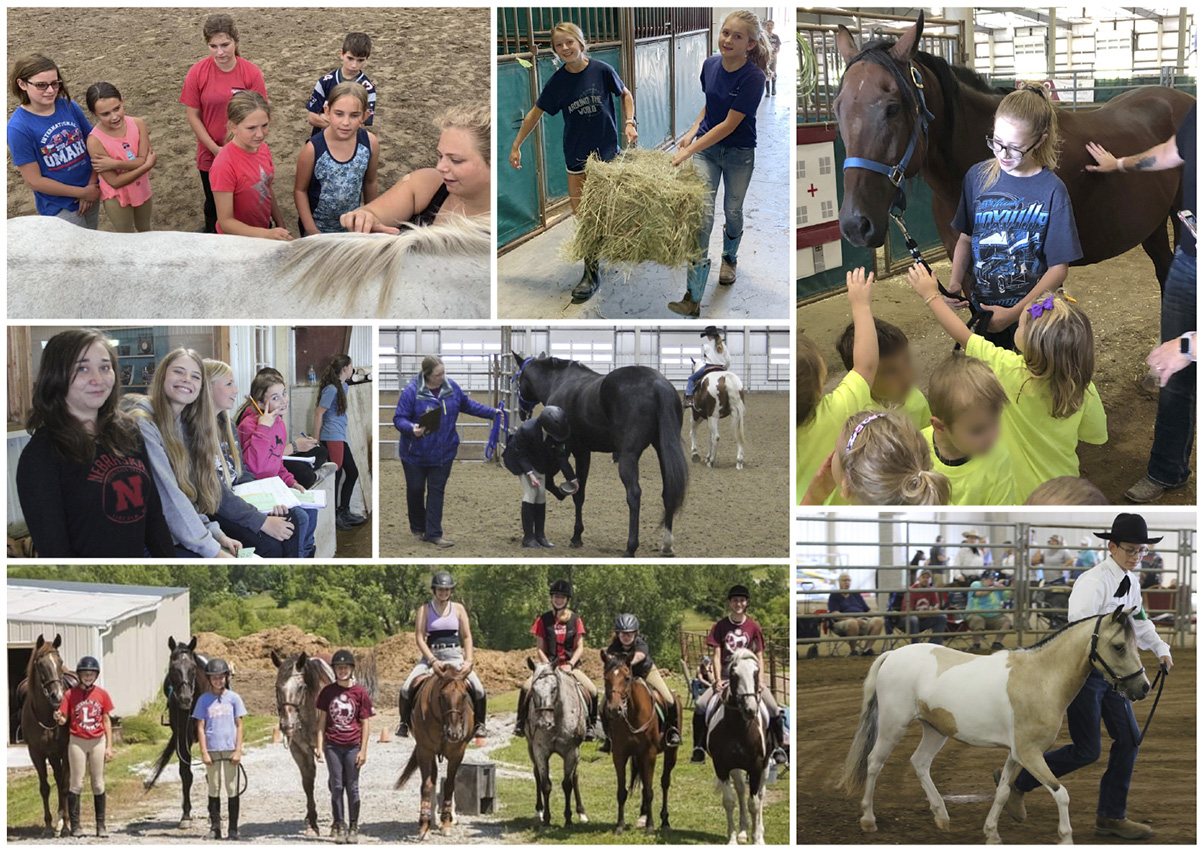
By Kate Pulec, Extension Assistant, Lancaster County
The horse is an animal that has provided people with many different services throughout history, from transportation, to agriculture, to recreation. A 2017 economic impact study of the United States horse industry estimated there are about 7.2 million horses in the U.S. and 180,000 of those horses reside in Nebraska. The horse industry currently contributes approximately $50 billion in direct economic impact to the U.S. economy and roughly 988,394 jobs (American Horse Council Foundation, 2018).
Horses in the 4-H program provide youth with an even more important opportunity: the opportunity to gain life skills and lifelong friendships.
ABOUT THE 4-H HORSE PROGRAM
The mission of Nebraska 4-H is to empower youth to reach their full potential, working and learning in partnership with caring adults. Young people learn best when they are involved in their learning. The Lancaster County 4-H horse program does just that. Participation in the 4-H horse project and non-riding competitive horse-related contests are tools for youth to develop life skills such as leadership, sportsmanship and handling pressure while simultaneously enhancing their horse knowledge (Anderson and Karr-Lilienthal, 2011).
Lancaster County’s 4-H horse program is the largest in the state, with over 165 youth from ages 8–18 enrolled in the horse project. These youth have the opportunity to participate in many riding and non-riding horse events throughout the 4-H year on a county, state and national level. Some events include district and state horse shows, horse judging and hippology contests, horsemanship advancement level testings, hands-on learning clinics and shows.
This year, youth participated in the Lancaster County horse program by joining one of the 21 horse clubs or participating as an independent member. Youth are required to provide their own horse. Raising an animal develops life skills such as goal setting, discipline, problem solving and a sense of responsibility. By working with their peers, caring adult volunteers and leaders in the horse program and community, youth develop positive learning experiences, teamwork skills and improve communication skills.
LEARNING/GROWING OPPORTUNITIES
The 4-H horse program begins by offering youth the opportunity to learn basic horsemanship knowledge, safety and skills, and then be tested on it. Youth use research-based curriculum created by Nebraska Extension which is broken down into four horsemanship advancement levels. As the levels increase, so does the knowledge and skill required to pass.
Youth can showcase the skills they have learned from level testing and clinics at local 4-H shows, including the Lancaster County Super Fair. The Lancaster County Super Fair holds the longest county fair horse show in the state. In 2019, the Super Fair 4-H horse show featured 44 events spanning six days, with 109 horse exhibitors competing in 1,046 total entries. Each of the classes require different levels of horsemanship skills and ability along with different riding disciplines. Some of the shows include Dressage, Hunter Jumper, Roping, Western, English, Miniature Horse, Trail and Games (speed events). Youth are encouraged to educate fairgoers about their 4-H horse project.
Lancaster County also offers a horse incentive program that allows youth to track the hours they spend doing horse-related activities. The goal is for the youth to learn organizational and record keeping skills, set goals, provide community service and show dedication to their project.
NATIONAL-LEVEL HORSE KNOWLEDGE
Lancaster County 4-H has had over 49 youth compete at the Western National Roundup contest in Denver, Colorado. Lancaster County youth have competed every year at nationals since 2011 in contests such as horse quiz bowl, horse judging, public speaking, demonstration and hippology. Once again, in January of 2020, a team of four Lancaster County youth will compete in the national hippology (horse knowledge) contest.
GROWING LIFE SKILLS
It is through all of these efforts that youth in the 4-H horse program have the opportunity to become true leaders and inspire others in our community. Youth who excel in horsemanship skills demonstrate a positive relationship in developing life skills such as decision making, thinking, communicating, goal setting and problem solving (Smith et al, 2006).
Hannah Ronnau, a former 4-H horse program youth member, says, “Lancaster County’s horse program gave me numerous valuable opportunities to improve my skills as an academic and an equestrian. Through district, state and national competitions, I learned how to study effectively, communicate to different audiences and manage time. It taught me how to successfully be part of a team.”
Ivy Dearmont, a former 4-H horse program youth member, says, “Everyday I find myself being grateful that I was a part of Lancaster County’s horse program. I am often reminded that this program helped me learn responsibility, perseverance and sportsmanship. It even helped guide me to the career path that I am in today!”
References:
• American Horse Council Foundation (2018). Economic Impact of the U.S. Horse Industry. Available at http://www.horsecouncil.org/resources/economics.
• Anderson, K. P. Karr-Lilienthal, L (2011). Influence of 4-H Horse Project Involvement on Development of Life Skills. Journal of Extension. [On-line], 49, 5 Article 5IAW2. Available at http://www.joe.org/joe/2011october/iw2.php.
• Smith, C. E. Swinker, A. M, Comerford, P. M, Radhakrishna, R. B., & Scheidt-Hoover, T. S. (2006). Horsemanship and life skills of youth in horse programs. The Professional Animal Scientist. 22(1):89-93.